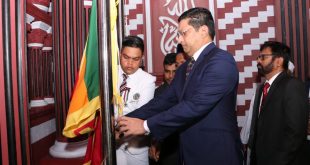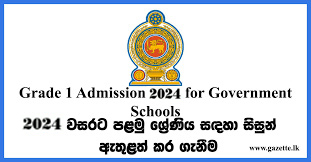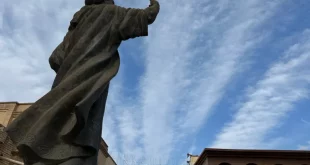With power comes arrogance. With arrogance comes a desire to impose one’s will on the weak, or in international relations, an itch to interfere in the affairs of other nations. Often arrogance leads to the downfall of the high and the mighty. History teaches us this lesson.
The United States, during the administration of President George W. Bush demonstrated its arrogance and invaded Iraq, paying little or no heed to the United Nations or the hundreds of thousands of anti-war demonstrators. However, before the Bush administration could do more damage to the United States, the government changed. The arrogance of the new administration of Barack Obama has still not reached the level that was witnessed during the Bush era though the manner in which Obama deals with Pakistan suggests otherwise.
But arrogance-led interference is not only the privilege of a superpower. Even regional powers display this quality, which is part and parcel of political realism.
The political crisis in Katmandu is a classic example where a regional power, in this case India, is being accused of interfering in the internal affairs of Nepal.
The accusation is made by none other than Pushpa Kamal Dahal alias Prachanda, who was until Monday, Nepal’s prime minister. India has rejected the claims that it engineered Nepal’s political crisis.
The crisis has been brewing since the appointment of Ram Baran Yadav, a Nepali Congress (NC) leader, as Nepal’s first president in July 2008 in the afterglow of the overthrow of the monarchy. Yadav was elected by the Nepali-Congress-dominated constituent assembly — not by parliament. The Maoist members in the constituent assembly opposed his nomination. Since then, there has not been much love lost between the Maoists and the President. It was only subsequently that the Prachanda-led Maoists, who had fought a ten-year civil war against the monarchy, won the elections and formed Nepal’s first democratically-elected government under a republic. However, the Maoists — officially known as the Communist Party of Nepal — could not win enough votes to form a government on its own and therefore had to rely on the support of the United Marxist-Leninist (UML), the Madeshi People’s Rights Forum (MJF), and 18 other parties. The Nepali Congress, seen usually as India’s favourite to rule this Himalayan nation, remained in the opposition, blocking Prachanda’s attempts to implement several decisions that all parties had agreed to during the peace process.
The crunch came last week, when President Yadav over-ruled Prachanda’s decision to remove the country’s army chief, Gen Rookmangud Katawal. Prachanda sacked Katawal because he failed to implement an order to incorporate the Maoist rebels into the regular force in terms of the peace deal which ended the Maoist rebellion. At an emergency cabinet meeting last week, more shocks awaited Prachanda. His allies, the UML and the MJF, boycotted the meeting. The Maoists felt they had been effectively isolated in what they saw as an Indian-inspired coup.
The Nepali Congress leader, Girija Prasad Koirala, called for Prachanda’s resignation and threatened to bring a no-faith motion if he did not quit.
Prachanda saw an Indian hand at work. He said that although his government had wanted cordial relations with Nepal’s neighbours, it would not bow down to foreign powers or depend on them to save its seat of power.
With Nepal having no effective government, the Nepali Congress (NC) is trying its best to form a coalition government — a national government of sorts. But how effective this coalition would be is the question with the Maoists accounting for nearly 40 percent of the seats in parliament.
The Maoists have said they would join the national government provided it takes measures to implement the decisions taken during the peace process. The demands include the incorporation of Maoists rebels into the regular army and the removal of Yadav, whom the Maoists believe is a pro-India puppet. They accuse him of trying to run a parallel administration, undermining the Maoist-led government. Yesterday thousands of Maoist supporters clashed with police who prevented the demonstrators from marching to the President’s house.
For Prachanda, giving jobs to former rebels is of paramount importance. Already, there are signs of discontent within the Maoists’ rank and file. India obviously fears a Maoist-dominated army.
It is no secret that the Maoists are pro-China. A pro-China government in Katmandu with an army dominated by the Maoists would mean a severe blow to India in its cold war with China. Thus India has a motive to topple the Maoist-led government in Nepal. That is exactly what the so-called Indira doctrine demands. Named after India’s former prime minister Indira Gandhi, this doctrine asserts that India is the only power in South Asia and no foreign power could dominate India’s neighbourhood. The only country where this doctrine could not be enforced is Pakistan, partly because of Pakistan’s traditional rivalry with India and partly because India did not have the muscle to compete with the United States, which had a strong foothold in Pakistan.
India on its part denied it had any role in the crisis in Nepal. Deputy External Affairs Minister Anand Sharma said India had not interfered in the internal affairs of Nepal.
“India has no intention of interfering in Nepal’s internal affairs. I may say that it was the internal consensus or the understanding of the political parties of Nepal which has unfortunately broken down and we hope that the process of democratic transition would be taken to a logical conclusion,” Sharma said.
But Nepal’s Maoists were not convinced. Maoist Finance Minister Baburam Bhattari insisted that it was India which supported the army and the President “in their unconstitutional acts against democratic forces.”
“It was an enormous blunder. It is going to cost India all the goodwill it earned by supporting the pro-democracy movement during King Gyanendra’s regime,” he said.
It was only a few days before the Maoist-led government resigned that Bhattari in an interview with India’s Hindu newspaper tried to allay New Delhi’s fears over growing Nepal-China relations.
“There is no need for India to worry about our relations with China. If there is some confusion, we have to sit down and solve it,” he said.
Noting that New Delhi had some misconceptions about his government, Bhattari said Nepal had to interact more with India socially, economically, and practically while acting as a bridge between India and China.
But Bhattari’s explanation did little by way of convincing India, which apparently did not like Nepal performing a balancing act between New Delhi and Beijing.
This was not the first time that India has been accused of effecting a regime change in Nepal over fears that Katmandu was leaning towards Beijing.
In 1989, India imposed an economic blockade on Nepal, a land-locked country which depends on India for external trade and financial stability, when treaties governing trade between the two countries expired. India refused to renew the treaties and closed all exit-entry points for several months, thus causing immense hardship to Nepal.
New Delhi made use of the situation to punish the then King, Birendra, for his decision to improve trade and military links with China, with whom Nepal shares a border. India saw Nepal’s growing military relationship with China as a violation of a 1950 treaty and agreements signed in 1959 and 1965 —agreements that effectively brought Nepal under India’s security umbrella and precluded it from purchasing arms from other sources without prior approval from New Delhi.
A hard-hit Nepal finally relented and renewed the trade agreements on India’s terms, which included the clipping of the wings of King Birendra under the guise of bringing democratic rule to Nepal. Obviously, India got the government it wanted in Katmandu.
Many Nepali analysts acknowledge that their country is not ruled from Katmandu but from New Delhi. No wonder, there is a general aversion to India among Nepali nationalists. If India does not amend its foreign policy in line with either the hallowed Panchaseela principles or the Gujral doctrine, every time a regime change takes place in a South Asian country in unusual circumstances, a secret Indian hand will be suspected. The burden of proof that it has nothing to do with political crises in neighbouring countries is on India.
 Sri lanka Muslims Web Portal Diversity and Inclusiveness
Sri lanka Muslims Web Portal Diversity and Inclusiveness



